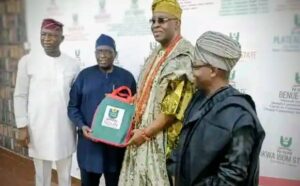
Professor Ibrahim Haruna of Agronomy Department, Nasarawa State University, Keffi (NSUK), has called on government at all levels and farmers to adopt Climate-Smart Agriculture (CSA) practice to mitigate the impact of climate change.
He said this at the university’s 33rd inaugural lecture held in Keffi local government area of Nasarawa State on Wednesday.
Haruna delivered the 33rd inaugural lecture on “Climate-Smart Agriculture (CSA): A sure means to sustainable crop production in a changing climate”.
He stated that climate change is the greatest menace that limits sustainable crop production.
“Hence, the need for farmers to adopt CSA practices so as to reduce the deleterious effects of climate change for sustainable crop production to ensure food security.
“A changing climate can cause several damages that cannot be quantified but Climate-Smart Agriculture can be a potential way out in different regions of the world to increase agricultural sustainability and resilience to climate change,” he said.
Haruna described CSA as practices and technologies that sustainably increase productivity, support farmers’ adaptation to climate change and reduce greenhouse gases.
He explained, “CSA has three pillars namely: Food security, adaptation/resilience and mitigation. It can also help governments to achieve national food security and poverty reduction goals.”
Haruna listed the CSA practices to include mulching, organic manure and crop yield, agroforestry, intercropping, crop rotation, inorganic fertilizer and crop production.
Others, according to him, include: combined use of organic and inorganic fertiliser, use of quality seeds and planting materials of well adapted crops and varieties and irrigation.
He, among other recommendations, called on the Federal Government to align and support climate-smart agriculture practices with a national policy and a legal and regulatory framework.
“Policies and legislation affecting seeds, inputs, finance, credit, insurance, land tenure and a range of other areas, all have scope to help or hinder the uptake of climate-smart agriculture,” he added.
The Vice-Chancellor of the University, Prof. Suleiman Bala-Mohammed, in his address, described the topic as apt, saying that it dealt with trending issues of food security both at the local and international levels.





